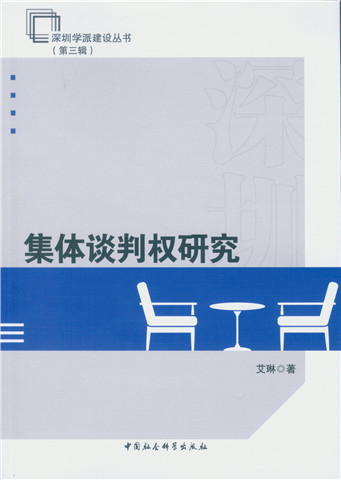On the background of social transformation and governance innovation in China,based on the full application of sociological theories and methodology,this book studies the construction of the most important social relation at present—the labor-capital relation,namely its structure and function,its relationship and activities,the disputes between the labor and the capital,the causes and current situation of the disputes as well as the approaches and mechanism to solve the labor-capital disputes and conflicts.In the end,it gives a general conclusion on the core outlet to the solution of current high incidence of labor-capital disputes in China.With the insights back into the construction history of the coordinative mechanism of labor-capital relation and disputes in western countries,it is easy to be observed that the periodic social background becomes the starting point for them to establish,improve and adjust labor-capital relationship.Similarly,China is experiencing the fast transformation from traditional agricultural society to modern industrial one.Several factors such as conflicts,tasks,characters and value orientation in the current and transitional society have become the impor tant contents which impose a decisive impact on the coordinative policies,means and mechanism on labor-capital relation and conflicts in China.Besides,the prevailing social governance innovation advocated by the government provides fresh participating forces,creates new chances,offers new thinking modes and new routes to action breakthrough,and brings new possibilities for the solution of labor-capital disputes and the rebuilding of their relation.Currently,un der the situation of undifferentiated labor supply and absolute dominance of capital in China,reasons for the labor-capital disputes mostly show up as contradic tions intensified after the capital invades the rights of the labor during the work,among which,the invasion of the salary,treatment and security rights of the labor becomes the most direct reason for the current labor-capital disputes.The generation,development and outbreak of labor-capital disputes in China closely relate to the factors such as the scale and structure of the enterprise,the constitution and relationship of the labor and capital.In most cases,in bigger enterprises with higher level of technology and skills,labor-capital disputes mostly represent as potential and invisible while in smaller enterprises with lower level of technology and skills they tend to be explicit and escalating.Different features of the capital and the labor,including the age,hometown,education level,experience,characters,social capital possessed will influence the actions taken by both sides during the disputes.The cooperative,in-fighting or confronting relations formed in daily interaction for both sides will lead to the coordinative,concessive,or obstructive orientation of labor-capital action correspondingly.Currently,we lack comprehensive cognition on the function of labor-capital disputes and conflicts.We always emphasize their negative influence and challenges on the social harmony,enterprise stability and economic development while neglecting the positive function and opportunities brought by them on the renewal of social self-regulation capability,the upgrading of economic industrial structure,the improvement of social and enterprise system construction.The above-mentioned thinking ability and mode have laid obstacles in different levels for the introduction of substantive policies and strategies on coordinating labor-capital disputes,which,as a result,increases the difficulty of resolving them.The different modes and means involved in labor disputes resolution are recognized by relevant authorities as falling into two types:official and unofficial.When a dispute occurs,the two parties involved,especially,the labor will choose,from the many modes and means available,the most appropriate strate gies to defend their own interests.The decisions are often made on the basis of a comprehensive calculation of the comparative powers of various factors such as the capital,the government,the labor and the relevant social mobilizing forces.In the case of individual action,the comparative strength between the labor and the capital will determine the labor's strategies.In the case of collective action,in this period of social transformation,the success and effects of collective action are directly affected by the government with its particular concept and practice of governance,its interference level and its governance efficiency and also by the social mobilizing forces led by mass media.The strategic moves and changes made by the labor and the capital tend to result from rational choosing,especially,rational economic gaming.In the process of labor-capital disputes,the capital will carefully consider the gains and losses involved in either compromising or confronting action before adopting its strategies;the government will determine its position and role and interference level by fully considering the gains and losses involved in either controlling or protecting action;the labor will act rationally to achieve maximum benefits for its own party;the social mobilizing forces will also act toward maximum gains for either the society as a whole or for their own groups as an individual entity.Generally,labor-capital disputes and conflicts resolution and its mechanism are extremely complicated.In this period of fast social transformation,our country should show proper understanding of the basic concepts,approaches,and fundamental measures needed to meet the challenge of highly frequent and increasingly intense labor disputes.Fully aware of the functions of labor disputes and conflicts,we propose that our proper attitude toward labor disputes should be one between ideal and practical,i.e.seeking maximum harmony while allowing mild disputes;fully aware of the dominating role the government plays in the political,the economic and the social life of this country,we propose that the most practical way to resolve labor-capital disputes is one led by the government through balancing the interests of all parties;we propose that the fundamental approach to labor disputes and conflicts should be an institutional one which has the advantage of being“an impersonal and disinterested force”and thus can effectively keep the government from being directly attacked in labor disputes.Key words:social transformation,social governance,labor-capital disputes,labor-capital conflicts
全部显示∨






